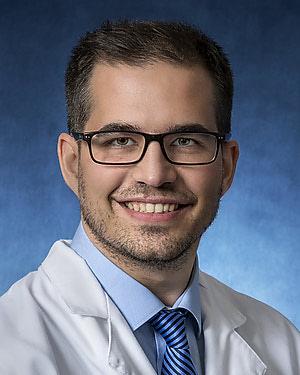A professor of medical oncology at Johns Hopkins University discussed his research on the evolution of blood-related cancers and how pathways to their growth can be inhibited at the weekly Bhussry Seminar hosted by the Georgetown University Medical Center Oct. 24.
The Bhussry Seminar series is an ongoing weekly series sponsored by the department of biochemistry and molecular and cellular biology, where scholars from around the country are invited to present their research.
The professor, Theodoros Karantanos, focused his research on preventing the development of leukemia from myelodysplastic syndrome (MDS), a precancerous state where blood cell production is disrupted.
“I’m trying to understand the main mechanisms and ways that leukemias kill patients and they continue to grow, become resistant to various treatments, and target those pathways,” Karantanos told The Hoya. “Myelodysplastic syndrome is a state of disease that hasn’t yet evolved to leukemia, but is already having the features of a cancer. My focus is understanding this evolution and trying to block it, because as soon as it goes to leukemia, it’s extremely hard to cure.”
Karantanos says that MDS can transform into secondary acute myeloid leukemia (sAML), whose multifaceted nature of targeting the body through the bloodstream from bone marrow makes it potent.
“When MDS transforms to sAML, then the cells start affecting the entire body, causing failure of the normal marrow. It doesn’t let the marrow produce normal cells, so the patient doesn’t have enough blood,” Karantanos said. “But when they transform to leukemia, the cells start attacking the body in many ways. Acute myeloid leukemia specifically can kill you within weeks if you don’t get treated because the cells dominate the entire marrow.”
Micaila Curtis (GRD ’25), a graduate student in the Georgetown biochemistry department who attended the seminar, believes that the specific blood cancer that Karantanos’s work focuses on is particularly prolific and difficult to solve, but could have a high payoff.
“Blood cancer is a systemic problem. It’s around your entire body. It’s not like a tumor where it’s centralized in one area,” Curtis told The Hoya. “The significance of Karantanos’s work is trying to look at a possible modulator that induces resistance of the cancer cells to certain drugs for the chemotherapeutics. It’s an area of research that through all of their expertise and what they’re researching, has a high potential to support better clinical outcomes.”
Soraya Tarrah (GRD ’23), a masters student in the biochemistry department at Georgetown who attended the seminar, said that Karantanos’s research in particular is unique because it takes into account differences between each individual’s cancer.
“What’s really interesting now is that with advances and next-generation sequencing and genomics, we’re starting to understand that cancer is quite unique to the individual.
We each have our own unique mutations,” Tarrah told The Hoya.
“Everybody impacted by cancer has mutations unique to them. Understanding how those unique mutations influence your outcomes is quite important. His research is specifically looking at the differences,” Tarrah added.

Tarrah believes that research is an important field for coming up with new solutions to disease progressions, especially in cases like Karantanos’s research on leukemia where evolutions allow the disease to proliferate as violently as they do.
“If you are interested in medicine, there’s a focus on not only what we can do for patients today, but what we can do for them in the future. I think it’s really important that we get students interested in conducting translational research because of its future implications,” Tarrah said.
Curtis said that regardless of their desired career, all students should pay attention to how research is done due to the new technology being developed that can be used in an array of different fields, exemplified by the Karantanos lab.
“I think it’s really important for students, especially in today’s world, where we have the Internet and we have generative AI and all of this new technology, to pay attention to the way we can see and do and treat and research,” Curtis said.
“As students go through their undergrad, I highly recommend them to pay attention to that, even if they’re not passionate or don’t want to immediately get involved with that type of research.”








